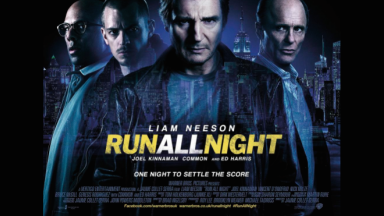
Liam Neeson used to make such interesting and diverse films. Schindler's List, Rob Roy, The Phantom Menace... Then, suddenly, along came Taken, and Neeson was unexpectedly transformed into this generation's Bruce Willis - an unexpected action hero fronting an endless series of gun-toting blockbusters. Taken 2 and 3 have followed (with copycats like Unknown) and Neeson has made the retribution thriller genre his own, becoming the heir to Charles Bronson and his Death Wish movies. Now, with the release of Run All Night, Neeson is again deep in familiar territory, although this time, he's the target, not the deliverer of revenge.
The film delivers exactly what the poster, the trailer and this mini-genre promises. It's violent, coarse, and contains a predictably-high bodycount; everyone shoots at Neeson, and Neeson shoots back (with deadly force). It's fairly good for what it is; well-acted, and creatively shot, with an innovative camera style that keeps zooming out to a super-wide shot of the dark city in which the action takes place. We might assume though that a film like this has little to engage with from a faith perspective, but that's where it took me surprise. Run All Night is a fascinating watch for the theologically-minded viewer, because it concerns itself with a theme that stands at the heart of the Christian faith: the problem of sin.
'There's things I've done... that can never be forgiven', growls Neeson in the film's opening monologue. 'In this life, no sin goes unpunished.' In a piece of casting that must have stretched him to his very limits, Big Liam plays washed up Irish-American hitman Jimmy, still employed by mob boss Shawn (Ed Harris) as a favour because of their long-term friendship. That alliance is shattered however when Jimmy shoots Frank's son dead in order to save his own son, Mike (The Killing's Joel Kinnaman, who gives the film's standout performance).
At which point, the film reveals the twisted morality of its characters' worldview. In the mob underworld, death is repaid with death, and a complex code of 'honour' means it's not just as simple as retaliation. Shawn not only wants Jimmy dead; he wants him to have to watch his own son die too. The title therefore describes the flight that father and son must make through New York City - trying to stay alive as its two most wanted men amongst waves of vengeful mobsters and corrupt police.
Even before that inciting incident however, Jimmy is a man broken by his 'sin'. He's killed 17 people before the film even begins (a number he significantly adds to), and the guilt is destroying him. There's no sense that what he's done can ever be redeemed, and so he finds his solace at the bottom of a bottle, miserable under the weight of the suffering he's caused.
Then he kills again, and unleashes a cycle of violence that just goes on, and on, and on. The myth of redemptive violence - present in so many Hollywood thrillers - is invoked: if Jimmy can just kill enough bad guys, the good guys will get to live in peace. The story takes an entirely unremarkable path, detoured a little by a one-dimensional 'end-of-level boss' played by rapper Common, and so by the end, that myth has been given credence. Bad guys lie dead everywhere, and the only sense of redemption lies in the fact that various evil forces have managed to extinguish one another through further violence.
The miracle at the heart of the Christian faith has something very powerful to say into this worldview. Grace takes the cycle of violence - where evil repays evil, over and again - and unexpectedly shatters it. Grace shows us a father who loses his son, and then offers life to those responsible for his death. Run All Night paints a picture of the alternative - a father who demands revenge - and as we watch, we know there's something deeply flawed in that bloodlust. Killing in revenge doesn't make things right, it just makes things wrong for someone else, and thus the cycle repeats.
As the film draws to a close, even Liam Neeson - by now utterly exhausted, and even more weighed down with guilt - reaches for some sort of confession. It's the first time in almost 100 minutes that someone has ventured near repentance, let alone ask for forgiveness. When it happens, the Director manages to sneak a cross into the shot, a little acknowledgment that these men are beyond help within their own value system, and badly need some sort of divine reset button in their lives.
That's how I felt all the way through Run All Night, wincing as the death toll crept up and up, while peace and reconciliation remained totally elusive. Revenge might feel like justice at times, but it's not the kind of justice that ultimately brings peace. The Bible says that 'the wages of sin is death' (Romans 6 v 23), and the eventual bloodbath here just underlines the point.
Run All Night is a great illustration of how helpless we are to defeat the power of sin on our own steam, and it fails to suggest an alternative. It does exist though; perhaps not in the realm of a Liam Neeson revenge thriller, but thankfully in the lives of all who might watch it. The film suggests that death must be paid for with death; the absence of grace in its worldview causes me to thank God that it's only a movie.
Martin Saunders is a Contributing Editor for Christian Today and an author, screenwriter and the Deputy CEO of Youthscape. You can follow him on Twitter: @martinsaunders













